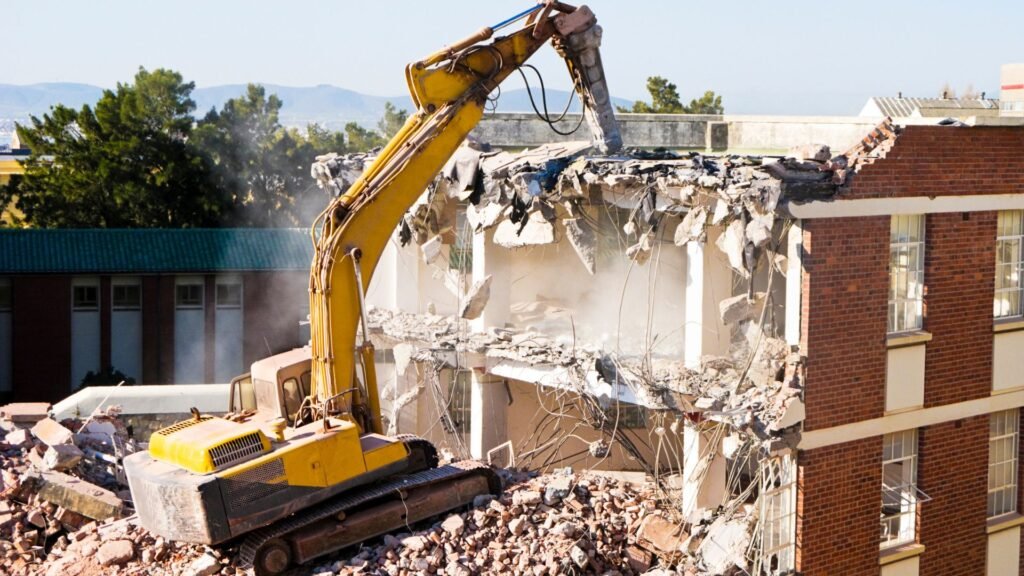Welcome to your complete guide on the cost for demolition services in NZ. Whether you’re planning to tear down an old home, clear a site for new construction, or remove a damaged structure, understanding how much demolition really costs can help you avoid budget surprises. From average pricing per square metre to permits, hidden fees, and tips for saving money, this guide will walk you through everything you need to know before hiring a demolition contractor in New Zealand.
The average cost for demolition services in NZ ranges from $10,000 to $40,000 for residential properties, depending on the size, structure type, site access, and whether hazardous materials like asbestos are present. Demolition costs typically fall between $70 and $150 per square metre, with additional fees for permits, waste removal, and utility disconnections.
Table of Contents
Average Demolition Costs In NZ
If you’re planning a demolition project in New Zealand, one of the first questions you’ll likely ask is: How much will it cost? The answer depends on several factors, but having a ballpark figure helps you set realistic expectations and plan your budget.
For standard residential demolitions, the average cost typically falls between $10,000 and $40,000. This wide range exists because each project is unique. For example, demolishing a small, single-story timber house in a suburban area will usually cost much less than removing a large, double-story home with brick walls and asbestos. The presence of materials like asbestos, difficulty of access to the site, and the amount of waste to remove can all increase the price significantly.
Commercial or industrial demolitions often cost much more due to their scale and complexity. These projects may involve multi-level buildings, reinforced concrete structures, and hazardous materials. They also tend to require more manpower, specialised machinery, and stricter compliance with local safety and environmental regulations. For this reason, commercial demolition costs can easily reach hundreds of thousands of dollars, especially in urban areas.
To help make estimates more accurate, many contractors break down demolition pricing by area. The average cost per square metre in New Zealand typically ranges between $70 and $150/m². This is a helpful metric, but it’s important to remember that it’s just a guideline. For instance, a flat, accessible site with no hazardous materials may fall on the lower end of that scale, while a tight site with limited access and asbestos issues could push the cost much higher.
Let’s look at two quick examples to put this into perspective. A 100m² house could cost anywhere from $7,000 to $15,000, depending on the structure and conditions. On the other hand, a 200m² house might cost between $14,000 and $30,000, assuming similar variables. These examples show how scale impacts cost, but again, many hidden factors could shift the price.
Understanding these averages gives you a solid starting point when talking to demolition contractors. It also helps you identify whether a quote seems too high or suspiciously low. Always ask for a detailed, itemised estimate and ensure that it reflects the real conditions of your site.
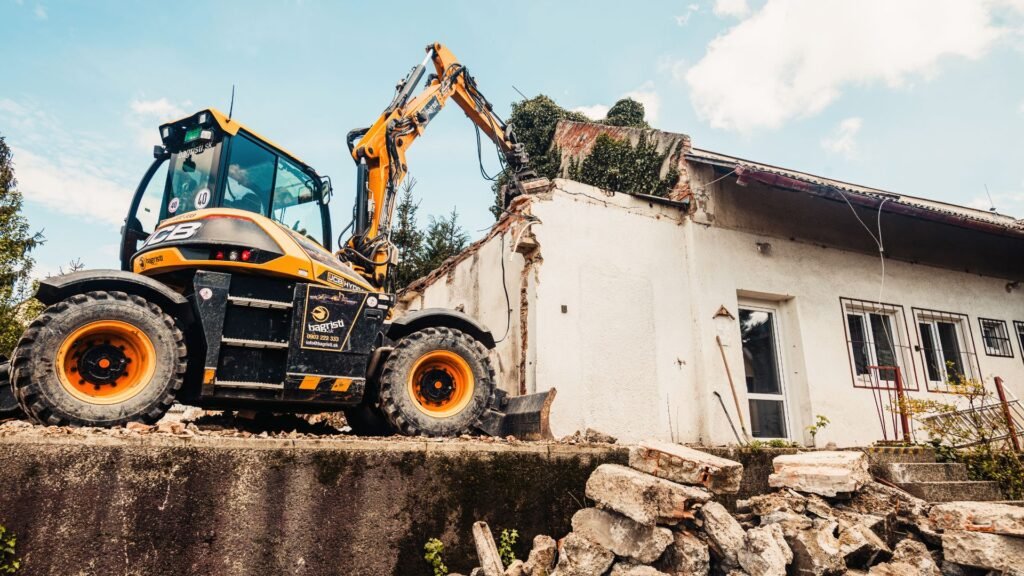
What Affects The Cost Of Demolition Services?
The cost of demolition services in New Zealand can vary widely based on several key factors. If you’re planning a demolition project, it’s important to understand what drives pricing so you can budget accordingly and avoid unexpected costs. Demolition is more than just tearing down a structure, it’s a combination of planning, labour, permits, and waste management. Here’s a detailed look at the factors that influence how much you’ll pay.
Type Of Structure (Timber, Concrete, Brick)
The material your building is made from plays a major role in determining demolition costs. Timber-framed homes are usually cheaper to demolish because they’re lighter and easier to break down. On the other hand, brick and concrete structures require heavy machinery and more time, which increases labour and equipment costs. For example, demolishing a single-story timber home will typically cost less than removing a two-story concrete building.
Size And Footprint Of The Building
Larger buildings cost more to demolish simply because they involve more work. More walls, roofing, and flooring mean more material to break down, remove, and dispose of. The footprint of the structure also matters, a wide, single-level home may be quicker to demolish than a compact multi-story one, but the total volume of waste can drive up disposal fees either way.
Access To The Site (Tight Spaces = More Labour)
If your property is hard to access, expect higher costs. Tight driveways, narrow streets, or buildings close to other structures may require manual labour or smaller equipment, both of which add to the time and cost of the job. In contrast, open areas with easy access for trucks and excavators reduce both labour hours and equipment handling costs.
Hazardous Materials (Asbestos Removal = Expensive)
Older buildings may contain asbestos in roofing, insulation, or cladding. If asbestos is present, you’ll need to hire licensed professionals to remove it safely before demolition can begin. This can add thousands of dollars to your project. Testing is mandatory in many areas and should be included in your budget upfront.
Manual Vs Mechanical Methods
Manual demolition, which involves workers using hand tools or small machinery, is often necessary for delicate or tight-space jobs. It’s slower and more expensive than mechanical demolition, which uses heavy-duty equipment like excavators and bulldozers. Mechanical methods are faster and cheaper for large, accessible sites, but may not be suitable in all situations.
Location (Auckland Vs Rural Areas)
Where you live also affects your demolition costs. Projects in major cities like Auckland often cost more due to higher labour rates, traffic management, and permit requirements. Rural areas may be cheaper in terms of labour, but you might pay more for transport and equipment if contractors need to travel far to reach your site.
Waste Disposal And Recycling Costs
Once the structure is down, everything must be sorted and hauled away. Disposal fees vary depending on the materials involved and the local landfill or recycling rules. Some contractors separate recyclable materials like concrete, wood, and metal to reduce waste disposal costs, but the sorting process can still increase labour fees. It’s important to ask whether recycling is included in your quote.
Permit And Council Fees
Before starting any demolition project, you may need to obtain a permit from your local council. These permits come with fees that can range from a few hundred to several thousand dollars, depending on the scope of work and region. Failing to get the right permits can delay the project and lead to fines, so always factor these into your total budget.
Quick Checklist: What You Need To Get An Accurate Demolition Quote
- Type of structure (timber, brick, concrete)
- Building size (square metres or floors)
- Location (city or rural)
- Site access details (tight spaces, shared driveways)
- Known hazards (asbestos, lead paint)
- Preferred timeline for the project
- Utility status (connected or already disconnected)
- Photos or architectural plans (if available)
- Whether you want full removal or partial demolition
- Any specific requirements for recycling or salvage
Providing these details upfront helps contractors give you a clear, accurate quote, no guesswork, no hidden surprises. Letting them know the full picture saves time and ensures the price you get is the price you pay.
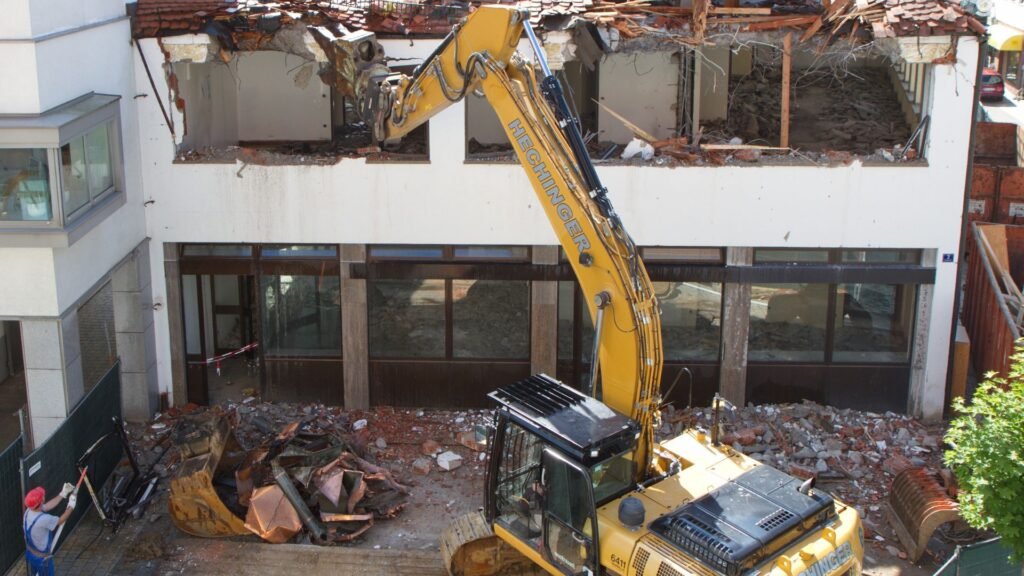
Hidden Costs To Watch Out For
When planning a demolition project in New Zealand, most people focus on the upfront quote. But there’s more to the total bill than just tearing the building down. Several hidden costs can sneak up on you if you’re not prepared. These extra expenses are often necessary and unavoidable, especially when dealing with older structures or complex sites. Understanding these hidden costs helps you ask better questions and avoid budget shocks later on.
- Asbestos testing and removal is one of the most common hidden costs in demolition work, especially for homes built before the 1990s. Asbestos is a hazardous material that must be professionally identified and safely removed under strict health regulations. The process can cost anywhere from a few hundred to several thousand dollars, depending on the amount and location of the material.
- Utility disconnections are another important factor. Before any demolition begins, all power, gas, and water lines must be safely disconnected. While this might sound simple, it usually involves coordination with utility providers and can come with service fees or scheduling delays. If the services are not handled correctly, it can create safety hazards and lead to fines or project delays.
- Soil testing or contamination checks may be required if there’s a history of industrial use, fuel storage, or chemical exposure on the site. Councils or contractors might request these tests to ensure the soil is safe for future construction. If contamination is found, cleaning it up can significantly increase your costs.
- Traffic management and fencing requirements are often overlooked. If your site is near a busy road or public space, you may need temporary fencing, signage, or even a traffic control plan. These measures are essential for safety and compliance, but they can quickly add hundreds or thousands of dollars to your project.
- Extra fees for last-minute changes or weekend work are common in the demolition industry. For example, if you ask your contractor to adjust the timeline or work outside of standard hours, expect to pay premium rates. Some demolition teams also charge more for urgent jobs or unexpected challenges discovered during the process.
Have you asked your contractor about these? It’s important to request a detailed, itemized quote that outlines potential extras. That way, you can compare prices accurately and avoid being blindsided once work begins. A good contractor should be transparent about what’s included and what’s not, giving you full control over your demolition budget.
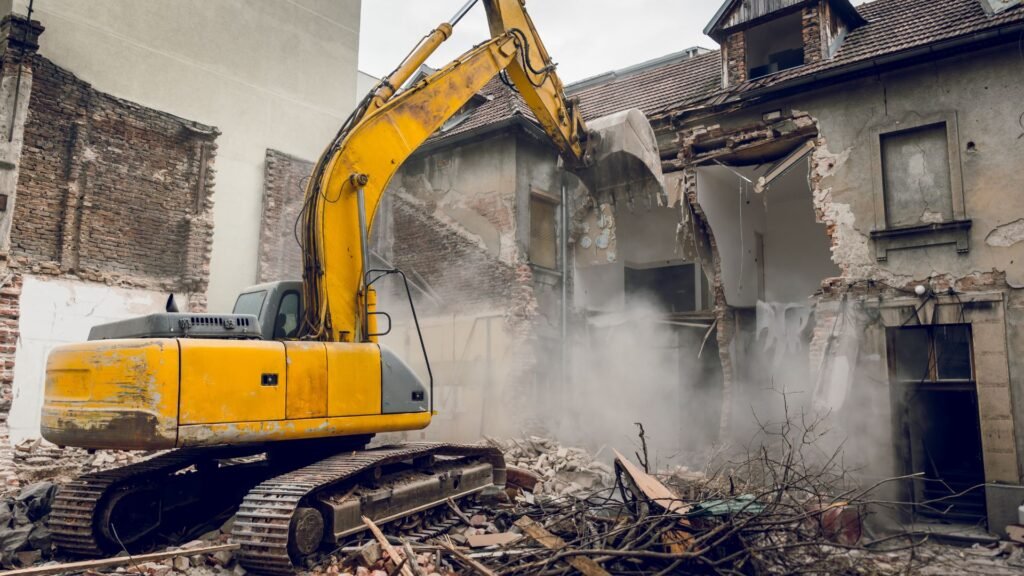
How To Get An Accurate Demolition Quote
Getting an accurate demolition quote isn’t just about asking for a price. It’s about giving the right information and knowing how to spot a reliable contractor. Many homeowners and developers in New Zealand get caught off guard because they don’t provide enough details up front or they accept the first offer without comparing. If you want a fair quote that reflects your actual project cost, here’s what you need to do.
Start by preparing the key details a contractor will need to give you an accurate estimate. Include clear photos of the property from different angles, the total square footage of the structure, and any access issues that might affect machinery or crew. If the building is close to another property, has limited driveway space, or is located on a hill, make that clear. These details help the contractor assess labour, equipment, and time required.
Next, always request an on-site inspection. While online forms may seem convenient, they usually result in rough estimates that can swing up or down significantly once the crew actually sees the site. An on-site visit allows professionals to check for hidden factors like asbestos, underground tanks, or unstable ground that could impact cost and timeline. It also builds trust, you get to meet the team and ask questions in person.
Be wary of quotes that seem too vague or too cheap. A professional quote should list specific services, such as asbestos testing, permit handling, waste removal, and site clearance. If a quote only gives a lump sum with no breakdown, that’s a red flag. Also, if the price is dramatically lower than others, ask why. It could mean corners will be cut or unexpected charges will appear later.
Finally, always get at least two to three quotes. This helps you spot any inconsistencies and gives you room to negotiate. Not all contractors price their services the same way, so having options gives you leverage. Don’t just choose the cheapest, compare what’s included, who’s more experienced, and who communicates clearly. That’s how you avoid surprises and keep your project on track.
By giving the right details, requesting on-site visits, and comparing multiple quotes, you’ll be in a strong position to make a smart, informed decision and get the best value for your money.
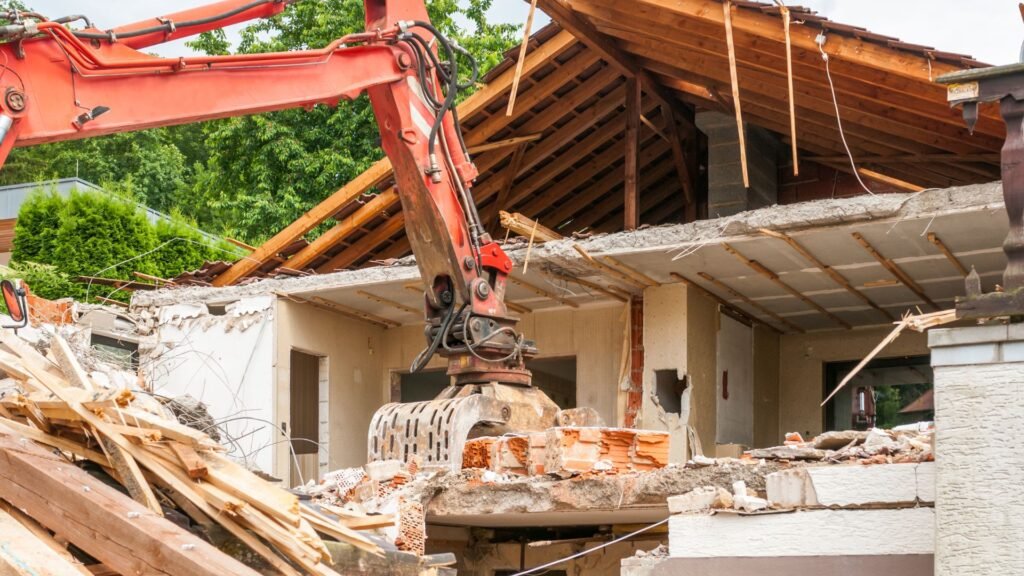
Ways To Save On Demolition Costs
Demolition projects can be expensive, but there are practical ways to reduce your total spend without cutting corners. If you’re planning a residential or small-scale commercial demolition in New Zealand, small decisions can lead to meaningful savings. Here’s how you can keep costs under control while still getting the job done safely and efficiently.
One of the most overlooked ways to save money is by salvaging reusable materials before full demolition begins. Items like old bricks, hardwood timber, metal fixtures, windows, and even kitchen fittings can be sold, reused, or repurposed. Contractors may charge less if they know they don’t need to handle the removal and disposal of these materials. Some companies will even give you a credit if they can sell the salvaged materials themselves.
Another cost-saving step is doing light preparation work yourself. If you’re allowed to, consider clearing out non-structural debris before the crew arrives. This could include removing furniture, flooring, cabinetry, or sheds that don’t require professional tools or heavy equipment. Be sure to discuss this with your contractor to avoid removing anything that might be tied to permit or safety requirements.
You may also be able to reuse some of the concrete or brick rubble on-site as fill material. This can reduce both waste disposal fees and the cost of bringing in new base layers if you’re preparing for a new build. Check with your demolition company and your local council to ensure this option is legally permitted and doesn’t interfere with your plans or inspections.
Lastly, timing your demolition can impact the price. Peak demand usually happens during spring and early summer, when construction and renovation projects surge. If you schedule your demolition during slower months, typically autumn or winter, you may get more competitive quotes, shorter wait times, and better availability from contractors.
These simple strategies can help you reduce demolition costs without compromising the quality of the work. Planning ahead, asking questions, and working with a transparent contractor can make all the difference in your final bill.
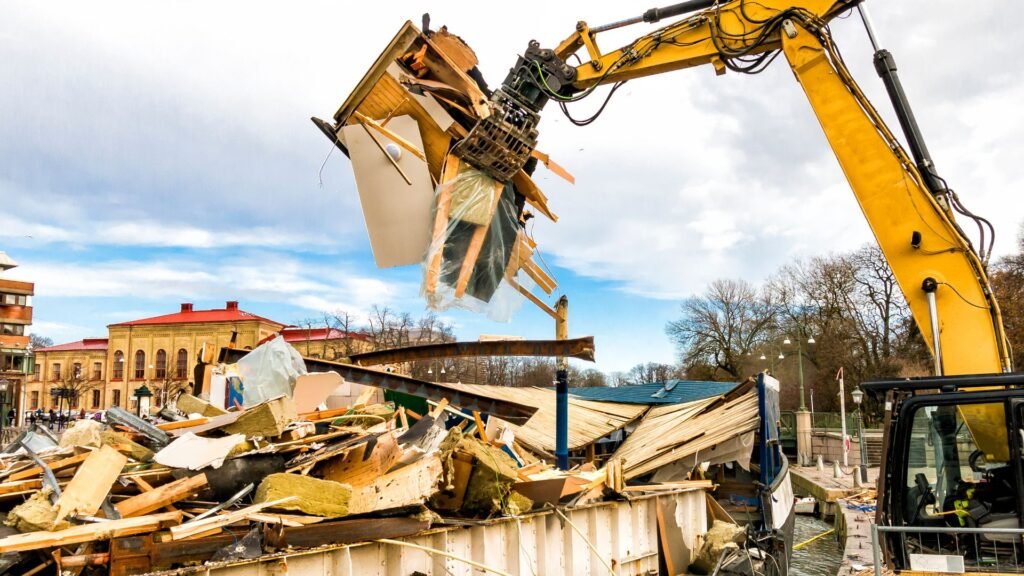
Do You Need A Permit To Demolish In NZ?
Before you start tearing down a house or any structure in New Zealand, you need to understand the permit requirements. In most cases, yes, a permit is required. But there are some exceptions. Knowing when you do or don’t need one can save you time, legal trouble, and extra costs.
You need a demolition permit if you’re removing an entire building or structure, especially if it’s a residential or commercial property. This applies to standalone houses, garages, commercial buildings, and even sheds if they’re large or permanently fixed. On the other hand, you may not need a permit for minor interior work, partial removals, or small, non-structural demolitions, like removing a garden shed or fence. Still, it’s always best to check with your local council before starting.
Permit rules and costs vary depending on where you live. Here are links to major councils where you can find current requirements:
- Auckland Council – Demolition and Building Consents
- Wellington City Council – Resource and Building Consents
- Christchurch City Council – Consent Applications
The approximate cost for a demolition permit can range from $200 to $1,000, depending on the location and scope of the project. Processing times usually take 10 to 20 working days, but this can vary during peak construction periods or if your application needs extra documents like an asbestos report or an engineer’s assessment.
Skipping the permit step is risky. If you proceed without approval, you could face legal penalties, stop-work orders, and costly delays. Even worse, insurance companies may refuse to cover damages resulting from unauthorized demolition. For homeowners and developers, it’s not worth the gamble.
Permit fees are a key part of the total cost for demolition services in NZ. They should always be factored into your budget, along with site prep, contractor fees, and waste disposal. Being informed upfront means fewer surprises later on. Always check the latest council guidelines and ask your contractor if permit assistance is included in their quote.
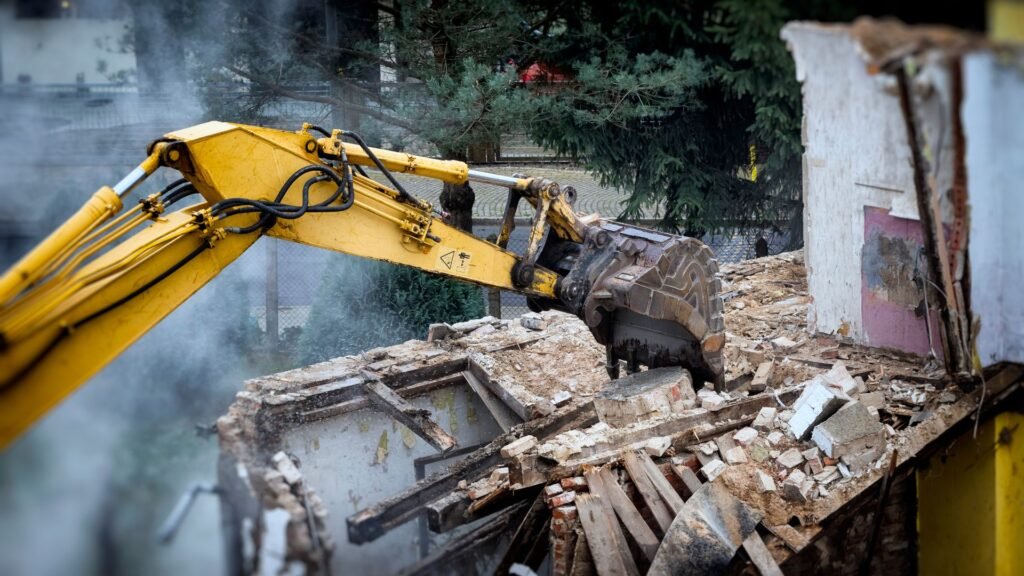
Demolition Vs Deconstruction: What’s The Difference?
When planning to remove a building, many people assume demolition is the only option. But there’s also deconstruction, a more methodical and eco-conscious alternative. While both approaches achieve the same end goal, they differ significantly in process, cost, and environmental impact. Understanding the differences between demolition and deconstruction can help you choose the right method for your project and budget.
- Demolition is the fastest and most affordable method. It typically involves heavy machinery tearing down a structure in a matter of days. Most of the debris is sent to landfills, and there’s little effort made to recover or reuse materials. This makes demolition ideal for projects with tight deadlines or limited budgets. It’s commonly used in residential knockdowns, commercial teardowns, and emergency removals where speed is a top priority.
- Deconstruction, on the other hand, is a slower process focused on dismantling a building piece by piece. The goal is to salvage as many reusable materials as possible, timber, bricks, windows, doors, even fixtures and fittings. While this approach takes longer and often costs more upfront due to additional labour, it significantly reduces waste. Homeowners and developers who prioritize sustainability often prefer deconstruction, especially for heritage buildings or properties containing valuable materials.
So, when does each method make sense? Choose demolition if your goal is to clear a structure quickly and cost-effectively with minimal concern for recycling. It’s often the better option for damaged buildings, small residential jobs, or when materials have little resale value. Opt for deconstruction if you want to reduce environmental impact, preserve valuable materials, or meet sustainability goals. It also makes sense when you’re working with a contractor who specializes in material recovery or if you plan to sell or reuse salvaged items.
In some parts of New Zealand, councils may offer green building incentives or rebates for choosing deconstruction over traditional demolition. These programs are designed to support waste reduction and promote sustainable building practices. It’s worth checking with your local council to see if any rebates or waste diversion credits are available before making a final decision.
Ultimately, the choice between demolition and deconstruction comes down to your priorities, whether it’s saving time and money or reducing environmental impact. Weigh the pros and cons of each, and consult with a licensed contractor to determine which method best suits your project.
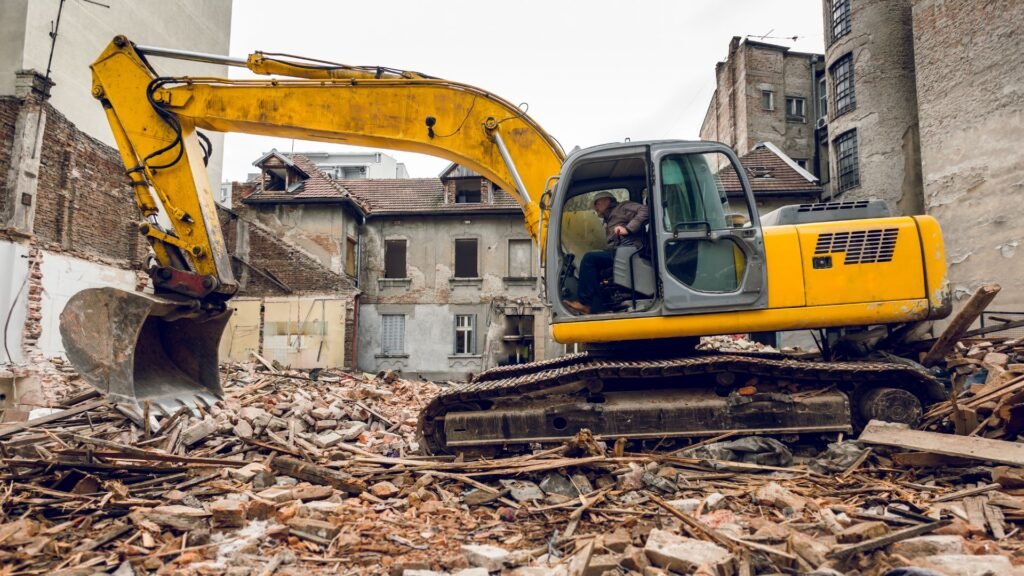
What To Look For In A Demolition Contractor
Hiring the right demolition contractor can make or break your project. It’s not just about tearing down walls, it’s about safety, legal compliance, and getting the job done without unexpected costs or delays. Before signing a contract, take time to assess the contractor’s credentials, experience, and reputation. Here’s what to look for to ensure you’re hiring a professional you can trust.
Licensed And Insured
Make sure the contractor holds a valid license for demolition work in New Zealand. This confirms they meet the minimum safety and legal standards required by local councils. Equally important is insurance. Ask for proof of public liability insurance to protect you if anything goes wrong on-site. Without proper coverage, you could be held responsible for damages or injuries.
Asbestos Certified
If the property was built before the 1990s, there’s a strong chance it contains asbestos. Removing asbestos without the proper certification is illegal and dangerous. Always choose a contractor who is qualified and licensed to handle asbestos safely. They should provide documentation of testing and removal procedures as part of their service.
Clear Pricing And Itemised Quotes
A reliable contractor won’t give you vague or overly simple quotes. Look for itemised pricing that clearly breaks down costs for labour, equipment, disposal, permits, and any extra services like asbestos removal. This transparency helps prevent budget blowouts and allows you to compare quotes fairly across different companies.
Positive Online Reviews Or Referrals
Online reviews on Google or trade directories give insight into a contractor’s reliability and work quality. Look for consistent feedback about professionalism, timeliness, and communication. If possible, ask for referrals from past clients or friends who’ve had demolition work done recently.
Experience With Your Type Of Project
Every demolition job is different. Tearing down a small timber shed is nothing like removing a two-storey concrete home in a tight city lot. Hire someone with proven experience in projects similar to yours. They’ll be better prepared to handle site-specific challenges and navigate council regulations efficiently.
Choosing the right contractor can save you thousands, not just on costs but on headaches. Take the time to vet your options properly before making a decision. A trustworthy demolition expert will be upfront, responsive, and equipped to deliver safe, stress-free results.
Ready to get a demolition quote you can trust? Visit us to connect with experienced demolition contractors across New Zealand. Get fast, accurate pricing, no surprises.
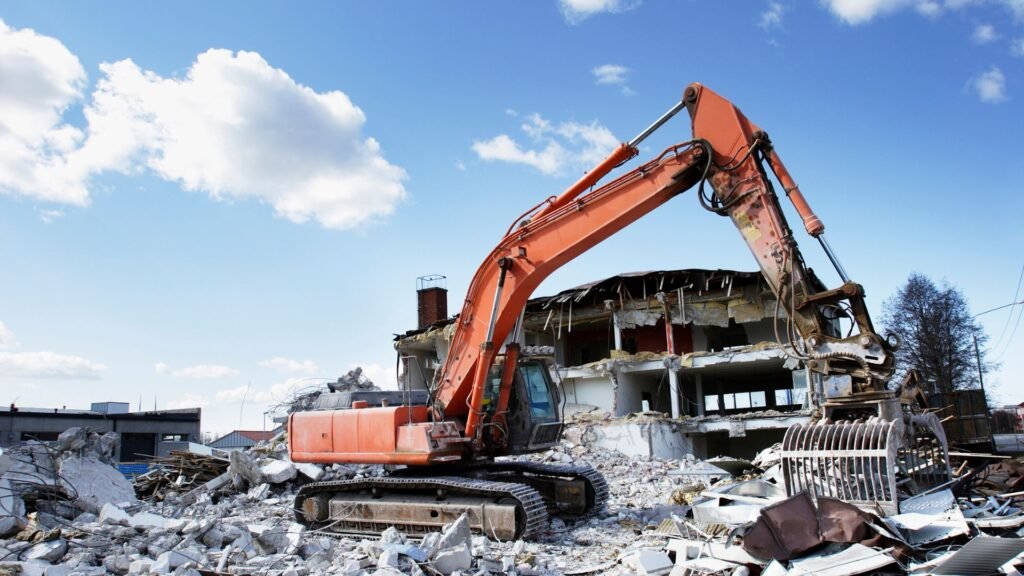
FAQs: About Cost For Demolition Services In NZ
How much does demolition cost in New Zealand?
Demolition costs in NZ typically range from $10,000 to $40,000 for residential properties. The price depends on the size of the building, materials used, site access, location, and any hazardous materials like asbestos.
What factors affect the cost of demolition services?
Key factors include the size and type of structure, access to the site, building materials, the presence of hazardous substances, disposal requirements, permit costs, and whether demolition is done manually or mechanically.
How much is demolition per square metre in NZ?
On average, demolition costs range from $70 to $150 per square metre. This includes labour, equipment, and waste removal, but may vary based on site complexity and location.
Do I need a permit for demolition in NZ?
Yes, most demolition projects require a permit, especially for complete structure removal. Permit requirements vary by council, so it’s best to check with your local authority before starting.
Can I demolish a house myself?
DIY demolition is possible for small non-structural tasks, but full house demolition must be carried out by licensed professionals due to safety, legal, and environmental requirements.
What are the hidden costs of demolition?
Common hidden costs include asbestos testing and removal, utility disconnections, traffic management, permit fees, waste disposal, and soil contamination assessments.
How long does a demolition project take?
Most residential demolitions take between 3 to 10 days once permits and prep work are complete. Larger or more complex projects may take longer.
What’s the difference between demolition and deconstruction?
Demolition involves tearing down a structure quickly with minimal material recovery. Deconstruction is a slower process that salvages reusable materials, often costing more but reducing landfill waste.
How can I save money on demolition?
You can lower costs by salvaging materials before demolition, preparing the site in advance, avoiding peak season scheduling, and comparing multiple contractor quotes.
What should I look for in a demolition contractor?
Choose a contractor who is licensed, insured, and experienced. Look for clear pricing, positive reviews, asbestos certification, and transparent communication during the quoting process.
Conclusion
Demolition costs in New Zealand can vary widely depending on the size of your property, the materials used, site access, and whether hazardous materials like asbestos are present. That’s why careful planning is key to avoiding unexpected expenses. Always ask for a detailed, itemised quote so you know exactly what’s included and what isn’t. Don’t overlook hidden costs such as permit fees, utility disconnections, or waste removal, as these can quickly add up. Make sure you understand the permit requirements in your area and choose a licensed, experienced contractor who communicates clearly and handles all safety regulations. Planning a demolition project? Compare quotes from trusted NZ contractors and ask the right questions before you start.

